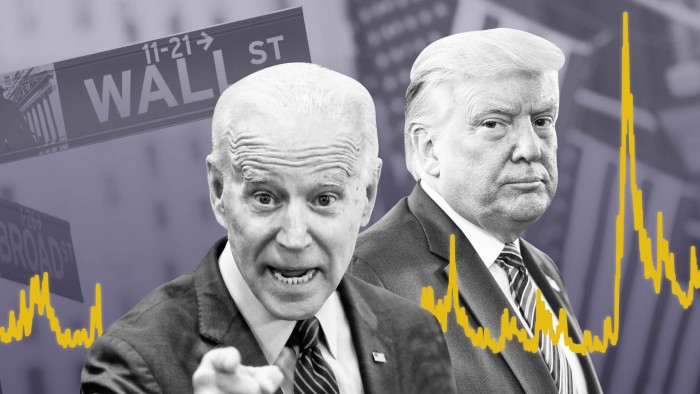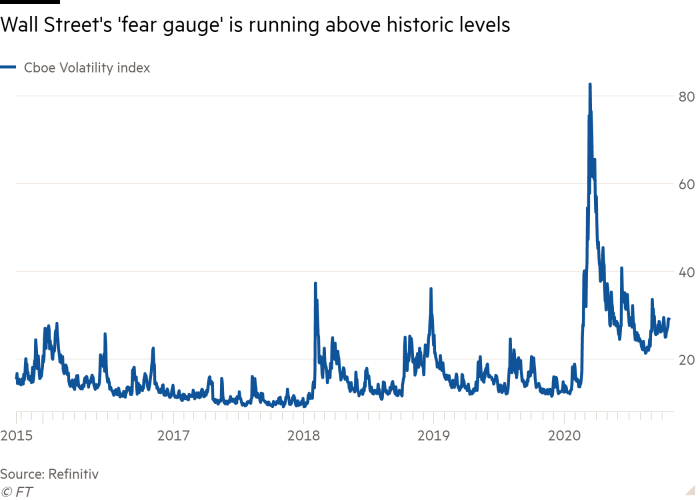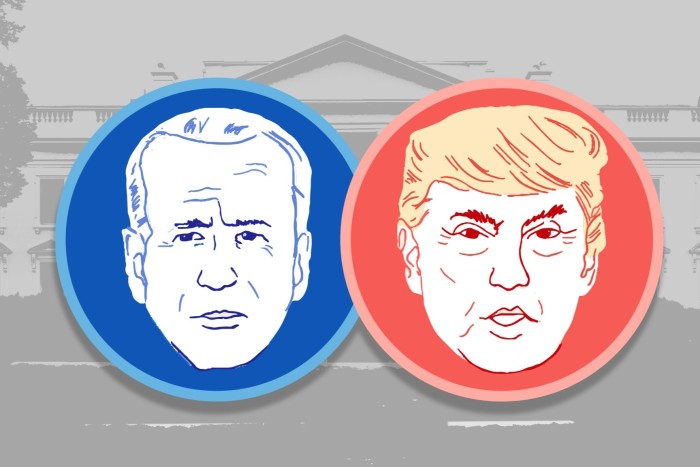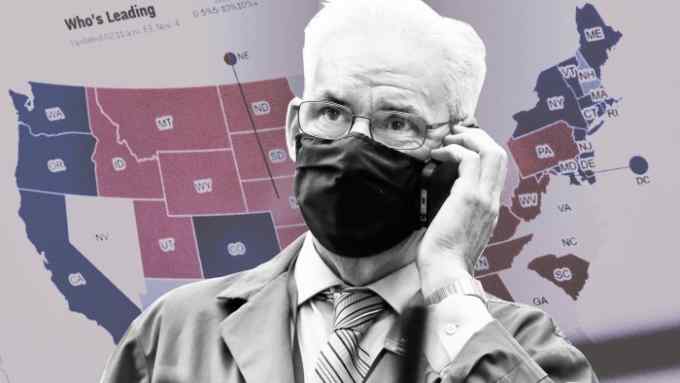Investors opt for the ‘do nothing’ trade ahead of US election

Roula Khalaf, Editor of the FT, selects her favourite stories in this weekly newsletter.
As the days count down to a US presidential election that could alter the course of global markets, some investors have crafted an odd-sounding strategy for navigating the outcome: they plan to do nothing.
Polls point to a clear win for the Democratic party on November 3, potentially on a scale large enough to take the presidency and both houses of Congress — a result that could ring changes in sectors such as energy and healthcare and set the direction of wider stock and bond markets.
But many investors are mindful that they failed to predict the shock victory of Donald Trump in 2016 — which triggered market convulsions on the night — as well as the longer-term equities rally that was stoked by his administration’s corporate tax cuts. Other surprises, such as the rise and then historic drop in sterling on the Brexit referendum night earlier that year, have left some investors preferring to just sit back and wait for the result.
“We’re an asset manager. We’re not bandits or gamblers,” said Vincent Mortier, chief investment officer at Amundi. “We don’t want to make a short-term trade that’s very speculative. That may sound like it’s not very courageous, but not making a decision is also making a decision.”
Rather than picking a winner and guessing the impact, Mr Mortier intends to stay neutral. He is telling portfolio managers to be ready for a range of outcomes, from a contested result to a Democratic clean sweep — and to decide at what price certain assets would appear cheap in a sell-off. “Our objective is not to have drama,” he said.
This approach is not confined to large asset managers; some short-term investors are also unusually wary.
“Most hedge fund managers are not trying to make investments based on a binary event like the US election,” said Karim Leguel, European head of hedge fund solutions at JPMorgan Asset Management, adding that managers were instead looking for trades likely to do well regardless of the result.
Some managers say they are selected to offer low volatility in returns. As a result, they do not want to have to explain to clients or bosses how they made big losses, or even big profits, as a result of an election punt.
“We’re not really trading the election. We’ve not really got a lot of risk on either way,” said Tom Clarke, who runs a macro fund at William Blair in London.

Macro fund managers, who trade bonds, currencies and stocks globally, have diversified their portfolios as a way of reducing risk in the run-up to the vote, according to Nathanael Benzaken, chief client officer at Lyxor Asset Management.
Equity managers, meanwhile, have cut the size of their overall bets and pulled back on wagers on stocks rising, he said. “It’s extremely difficult to manage a strategy on a binary outcome,” he added.
Fiona Frick, chief executive of Swiss investment firm Unigestion, said her firm had been balancing risks by buying put options — the right to sell at a pre-determined price — but also buying futures on underlying assets, which would make money if markets moved higher.
Even conducting private polling as a way of gaining an edge in an election — a strategy some hedge funds used for the Brexit vote — is fraught with danger. One senior hedge fund executive told the Financial Times they were unlikely to use such polling again after it backfired during another election. “It felt like we had an inside edge, which gave us some comfort, and we were completely wrong [about the result]”, the person said.
Sentiment among investors over the US election has switched markedly of late. Typically, Democratic victories are perceived as a path to higher taxes that dent corporate profits and drag equities lower.
That preconception sticks despite even recent historical examples: the benchmark S&P 500 index of US stocks more than doubled from the time Democrat Barack Obama was elected in 2008 to Mr Trump’s victory eight years later.
In 2020, though, a Democratic victory is not the bulls’ most problematic result. Instead, a contested outcome with Mr Trump refusing to accept a loss and clinging to power is thought to be much more disruptive. A Democratic win bringing higher levels of fiscal spending may instead be the most favourable outcome for stocks, analysts have said.
Even in the event of a sell-off, investors say reliable hedges are harder to find. Typically, US government bonds, the global haven asset, perform well in periods of stress. But yields on such debt are already minuscule, since the US Federal Reserve cut benchmark interest rates to near-zero in the depths of the coronavirus shock in March, giving the bonds little room to rally further in price. Equity put options, which profit from a drop in stock markets, are already expensive.
“A few years ago, I’d have told you it’s easy,” said Amundi’s Mr Mortier. “Now I’m a bit sceptical about putting on aggressive hedges, even though we have a feeling that something will happen.”
Trump vs Biden: who is leading the 2020 election polls?

Use the FT’s interactive calculator to see which states matter most in winning the presidency

Comments